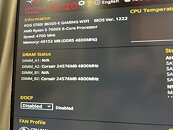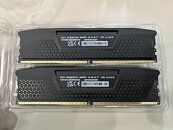- Joined
- Oct 9, 2007
- Messages
- 47,298 (7.53/day)
- Location
- Hyderabad, India
| System Name | RBMK-1000 |
|---|---|
| Processor | AMD Ryzen 7 5700G |
| Motherboard | ASUS ROG Strix B450-E Gaming |
| Cooling | DeepCool Gammax L240 V2 |
| Memory | 2x 8GB G.Skill Sniper X |
| Video Card(s) | Palit GeForce RTX 2080 SUPER GameRock |
| Storage | Western Digital Black NVMe 512GB |
| Display(s) | BenQ 1440p 60 Hz 27-inch |
| Case | Corsair Carbide 100R |
| Audio Device(s) | ASUS SupremeFX S1220A |
| Power Supply | Cooler Master MWE Gold 650W |
| Mouse | ASUS ROG Strix Impact |
| Keyboard | Gamdias Hermes E2 |
| Software | Windows 11 Pro |
Over the past month, memory manufacturers started releasing DDR5 memory modules of 24 GB and 48 GB densities, which make up 48 GB (2x 24 GB), 96 GB (2x 48 GB or 4x 24 GB) and even 192 GB (4x 48 GB) capacities. There's only one catch—these modules only work with 12th Gen Core "Alder Lake" and 13th Gen Core "Raptor Lake" processors, as their memory controllers support a maximum of 192 GB of memory, and 24/48/96 GB DIMM densities. MEGAsizeGPU decided to find out what happens when one of these kits is installed on an AMD Ryzen 7000 "Zen 4" platform.
A Corsair Vengeance DDR5-5600 48 GB (2x 24 GB) memory kit was installed on a machine consisting of an AMD Ryzen 5 7600X processor, and an ASUS ROG Strix B650E-E Gaming motherboard (BIOS version 1222). It turns out that the machine POSTs, and is able to start the UEFI setup program. Here, the program is able to display the correct 48 GB memory amount, and the memory density of each of the two modules. The trouble is, Windows would not boot, and does not go past the Boot Manager. It halts with an error message that indicates a hardware problem.




AMD Ryzen 7000 series processors technically have a 128 GB maximum memory size limit. Until a couple of months ago, so did 13th Gen and 12th Gen Intel Core processors, which means that this may not be a hard limit, even for AMD, and the company could work with motherboard manufacturers on firmware-level updates to enable support for 24 GB and 48 GB memory modules to at least operate under the 128 GB limit (think 2x 24 GB, 4x 24 GB, or 2x 48 GB). The introduction of 24 GB memory modules improves choices for PC enthusiasts, as it's now possible to have 48 GB of memory using faster single-rank DIMMs (2x 24 GB). It also strikes a middle-ground between 32 GB (2x 16 GB) and 64 GB (2x 32 GB).
View at TechPowerUp Main Site | Source
A Corsair Vengeance DDR5-5600 48 GB (2x 24 GB) memory kit was installed on a machine consisting of an AMD Ryzen 5 7600X processor, and an ASUS ROG Strix B650E-E Gaming motherboard (BIOS version 1222). It turns out that the machine POSTs, and is able to start the UEFI setup program. Here, the program is able to display the correct 48 GB memory amount, and the memory density of each of the two modules. The trouble is, Windows would not boot, and does not go past the Boot Manager. It halts with an error message that indicates a hardware problem.




AMD Ryzen 7000 series processors technically have a 128 GB maximum memory size limit. Until a couple of months ago, so did 13th Gen and 12th Gen Intel Core processors, which means that this may not be a hard limit, even for AMD, and the company could work with motherboard manufacturers on firmware-level updates to enable support for 24 GB and 48 GB memory modules to at least operate under the 128 GB limit (think 2x 24 GB, 4x 24 GB, or 2x 48 GB). The introduction of 24 GB memory modules improves choices for PC enthusiasts, as it's now possible to have 48 GB of memory using faster single-rank DIMMs (2x 24 GB). It also strikes a middle-ground between 32 GB (2x 16 GB) and 64 GB (2x 32 GB).
View at TechPowerUp Main Site | Source



 So much 'weirdness', I eventually 'took a long break' from the build. I got 'enthusiastic exhaustion' from trying to get around memory mapping issues.
So much 'weirdness', I eventually 'took a long break' from the build. I got 'enthusiastic exhaustion' from trying to get around memory mapping issues. 


